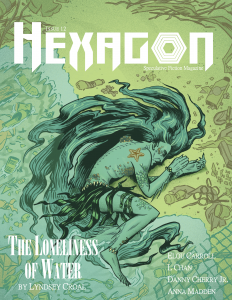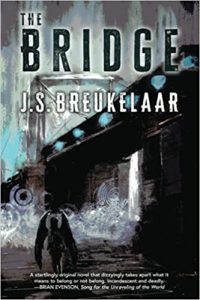Charles Payseur Reviews Short Fiction: Hexagon, Lightspeed, Flash Fiction and Fantasy
 Hexagon 3/23
Hexagon 3/23
Flash Fiction Online 3/23
Lightspeed 3/23, 4/23
Fantasy 3/23, 4/23
Hexagon’s latest issue presents a range of speculative fiction and poetry, including Lyndsey Croal’s postapocalyptic science fantasy, “The Loneliness of Water”. The piece introduces a woman living on her own on a partly ruined island, making a home for herself while searching for signs that she’s not the only survivor to the great calamity that stranded her there. What she finds as she walks near to the shore, however, isn’t the signs of humanity she was looking for – it’s the presence of a decidedly nonhuman visitor to the island. And yet, as the two test the waters of each other’s intentions and actions, they might find a way through the darkness of the shadows cast by the destruction of the past and the loneliness of the future. If, at least, they can find a way to escape both and embrace something new and strange. Croal does lovely work easing the characters into each others’ orbit and letting their isolation and yearning do the rest.
The March Flash Fiction Online explores some grim themes, as in Matthew F. Amati’s “About Her Bones So Bleak And Bare”, where a family watches a girl’s ghost, her curse, flitting across their land. From that start, though, things only get bleaker, as the true weight of what has happened and why settles over husband, wife, and daughter. And as the full horror of the situation is revealed, so too comes a chance to break the cycles of violence and hate that are the true curses laid on the family. Amati finds hope in the deep shadows, though not easily, and not without a cost.
Lightspeed kicked off its March issue with Daniel H. Wilson’s rather chilling “Crystalline”, a story about a narrator who goes on a camping trip to reconnect with his wife and daughter. While out, though, the three come across a mysterious cave, and an incredible power inside – a crystal that connects to every alternate reality. When the narrator accidentally summons something he shouldn’t have, though, he becomes convinced it takes the innocence of a child to work properly, and… well, things don’t go as he hoped. Wilson keeps this tense and creepy as he reveals the narrator’s many faults, and how they come to bloody fruition. Oyedotun Damilola Muees’s “The Chosen Six” is an epistolary tale recounting the narrator’s recruitment into a kind of sanctuary that could, if completed, help a great many villages escape the ecological destruction plaguing them. Each of the titular six characters were chosen for the abilities they possess that have been passed down in their villages, and only together can they hope to push back against the tide of pollution and corruption to find a hope of healing the land and its peoples. Muees does careful work in mixing science and magic, family and being part of a larger community and system. And while the story starts small with what the characters are trying to save, the stakes of their work couldn’t be higher.
March’s Fantasy features a tender and moving look at music, inspiration, and care in P.H. Low’s “The Will of the God of Music”. In it, Blake was made the vessel of a god, but was rejected soon after, and that rejection has come with serious and lasting damage, leaving them unable to continue their training and left wondering what comes next. They are cared for by their boyfriend, Evan, but even that seems different after the rejection, wrapped up in Blake’s fears and insecurities. Low captures an aching feeling, Blake having been touched by the divine but then cast aside, injured in ways intimate and profound, unable to see their own value because of what they have lost. Rejection is easy to internalize, especially in creative pursuits, and what Blake’s going through might resonate with those who have experienced a moment of intense triumph only to find that no pursuit – or life – is defined by a single moment, whether for good or ill. And that what might be more important than success is how people approach the process, and how people treat those around them. It’s a beautiful story. Tonya Liburd’s poem “Possession” sinks into a voice laced with promises – if only you’ll let them in. In where? To your body, to your mind, to your very essence. But as the voice gains entry, they also drop some of their pretense, revealing a hunger and an ever-bolder ambition with how to use the power you’ve given them. Liburd entices and unsettles as readers are drawn deeper and deeper, and as the voice whispering in their ear reveals the full scope and chilling trajectory of their possession.
Returning to Lightspeed and its April issue, Brian K. Hudson opens things up with “Virtually Cherokee”, a story framed as a transcript of a virtual interview between an AI influencer (who looks like an anthropomorphic microphone) and Spider, a computer scientist who helped create the first digital person. The story interrogates consciousness and sentience through a layering of artificiality with a backdrop of a movement to deactivate all possibly sentient AIs and deny personhood to anyone digital. And all that is filtered through the perspective of the transcriber, who is also digital, and who can sense in this interview a change – a shift in how digital people can connect, cooperate, and build community together, using language and storytelling. Hudson manages a technically very complex story by keeping the focus on the interplay between the interviewer and interviewee, with interjections from the transcriber, resulting in a piece that is fun to read but which offers a rich challenge for those wanting to dig a bit deeper into the story, its characters, and the world it introduces. It’s a fascinating and fantastic read. Bogi Takács keeps the focus on systems, prejudice, and the power of communication in “Construction Sacrifice”, which follows Mihue, a recent immigrant to the city of Fejértorony, and the mind of the city itself, which comes from the titular sacrifice – a person who willingly left their human body to become one with the many streets, animals, and even people residing inside them. For all that Fejértorony and Mihue meet and talk and form a connection, though, the city is not necessarily a safe space for Mihue, who as an immigrant faces racism, hate, and violence because of where they come from. Takács explores what that hate means for Mihue and Fejértorony, how they are bound by more than just their affinity towards one another, and how they can work toward finding a place to belong and be safe. The worldbuilding of the piece is imaginative and deep, the plot moving from quiet and conversational to dangerous and immediate, and the characters pop with personality and hope even as their futures seem to narrow to a point punctuated by violence and loss.
I’ll close things out with a stop at Fantasy’s April issue, which features Dennis Mugaa’s “Nairuko”, in which the titular character is part of a tribe that was almost wiped out in a colonizing genocide. Those who survived did so only because of a spontaneously developed new power to teleport through visualization. Now their descendants carry on that power, as well as the mission to protect themselves – at the expense of others. But Nairuko is young, just come into her power, and she doesn’t want to leave the close friendship she has found with Rahma in a secessionist part of former Kenya. When war comes, Nairuko has to decide how to live, how to survive, and how to carry the inheritance of guilt that grows with each new generation. Mugaa confronts readers with great power that refuses great responsibility not out of greed but experience, but which still has to contend with regret, loss, and tragedy. It’s a powerful and resonating read.
Recommended Stories:
“The Loneliness of Water”, Lyndsey Croal (Hexagon 3/23)
“The Will of the God of Music”, P.H. Low (Fantasy 3/23)
“Virtually Cherokee”, Brian K. Hudson (Lightspeed 4/23)
“Construction Sacrifice”, Bogi Takács (Lightspeed 4/23)
“Nairuko”, Dennis Mugaa (Fantasy 4/23)
Charles Payseur is an avid reader, writer, and reviewer of speculative fiction. His works have appeared in The Best American Science Fiction and Fantasy, Lightspeed Magazine, and Beneath Ceaseless Skies, among others, and many are included in his debut collection, The Burning Day and Other Strange Stories (Lethe Press 2021). He is the series editor of We’re Here: The Best Queer Speculative Fiction (Neon Hemlock Press) and a multiple-time Hugo and Ignyte Award finalist for his work at Quick Sip Reviews. When not drunkenly discussing Goosebumps, X-Men comic books, and his cats on his Patreon (/quicksipreviews) and Twitter (@ClowderofTwo), he can probably found raising a beer with his husband, Matt, in their home in Eau Claire, Wisconsin.
This review and more like it in the May 2023 issue of Locus.
 While you are here, please take a moment to support Locus with a one-time or recurring donation. We rely on reader donations to keep the magazine and site going, and would like to keep the site paywall free, but WE NEED YOUR FINANCIAL SUPPORT to continue quality coverage of the science fiction and fantasy field.
While you are here, please take a moment to support Locus with a one-time or recurring donation. We rely on reader donations to keep the magazine and site going, and would like to keep the site paywall free, but WE NEED YOUR FINANCIAL SUPPORT to continue quality coverage of the science fiction and fantasy field.
©Locus Magazine. Copyrighted material may not be republished without permission of LSFF.





